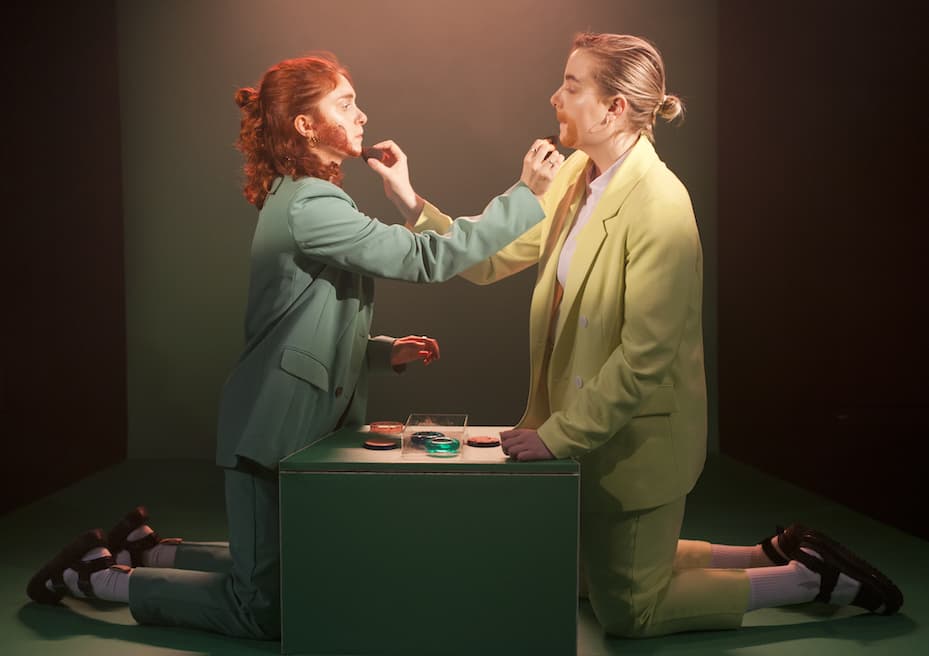Ell Potter wants to know what gets you hot
Three years ago, theatre-makers and former girlfriends Ell Potter and Mary Higgins interviewed womxn aged 11 to 97 about what gets them hot. The result was HOTTER, a sell-out show about porn, orgasms, queerness and the Ell and Mary’s changing relationship. Now, they’ve shifted gear with FITTER: an examination of masculinity built off interviews with men and masculine-presenting people, interspersed with “shit drag”.
We sat down with Ell, one half of the creative duo, to hear her what she learned about contemporary masculinity in the process…
How did you and Mary meet and start collaborating?
Mary came up to me in a pub, having barely spoken to me before, and asked me to make a show with her. Later she told me it was because she fancied me, and she wanted a way to spend time with me. In my opinion, it’s the most convoluted seduction technique the modern world has ever seen. But you have to admire the dedication.
As ex-girlfriends, how would you describe your working dynamic?
We have so much shared language and experience it almost feels like we’re telepathic at times. If someone starts a sentence the other already knows how it’s going to end. This means when we’re making creative decisions it’s like “BAM”; firing all cylinders, barely getting to the end of a sentence before we’re on to the next idea. We also trust each other so much and are totally honest and open with each other. It’s really unlike any other relationship I’ve ever had. It means making work together is a dream: if I’m feeling like crap, I’ll just say so. We balance each other out.
What did you learn from the process of creating HOTTER and then FITTER?
The way we make our theatre is by asking questions. For HOTTER we interviewed womxn aged 11 to 97, and for FITTER we interviewed men and masculine-presenting people aged 8 to 102. To try to boil down what we learned from these experiences would be almost impossible. The whole process was an exercise in learning beyond the limited experiences of our own white, cis-gendered, queer female bodies. I guess the overarching lesson was that you gain so much from just listening.
What led you to create FITTER – why the shift from feminine experiences to masculine ones?
We never second-guessed the fact that we didn’t want to interview cis men for HOTTER. I guess at the time we just weren’t interested in what they had to say, or didn’t think that they deserved a show dedicated to the male bodily experience. After the show cis men would sometimes come up to us and say ‘why didn’t you interview men for this show?’ Initially we had a good old giggle about the audacity of these men but we then realised we had a lot of preconceptions about men (some fair, some unfair) that made us want to ignore them. FITTER is not only about what it means to be a man in 2019, but also about why, as queer women, we often feel so guarded around men.

How do you think the “men are trash” rhetoric has impacted your experience of female bisexuality?
Whenever I find myself falling for a man I think ‘for God’s sake. Not again.’ I have the capacity to love women: why would I ever choose to go for a man? There’s something ever so slightly embarrassing about admitting to your queer friends that you fancy a guy. It’s the age-old bisexual dilemma: not gay enough for your gay friends, not straight enough for your straight ones. But the ‘men are trash’ rhetoric is reductive and lacking in nuance. I know that it’s part of my internalised bi-erasure, so I try hard to work against that mentality.
What are some of the things you learned about masculinity from the process of creating FITTER?
1. For people with penises, lots of first-wank experiences are clouded by shame: they describe secretly discovering masturbating without really knowing what it was, the early furtive discovery of porn, and the pressures to start wanking way earlier than they were ready to. The feeling that masturbation is somehow inherently shameful still sits with a lot of the people we interviewed, even now. Which was a sad realisation.
2. It’s so well-known that ‘men don’t cry’ – in fact it’s repeated so often it’s almost a cliché. But it’s a cliché because it’s true. So many of the men we interviewed equated growing up with getting more numb, crying less, getting more emotionally reserved. Some hadn’t cried in literal decades.
3. Being aware of the phrase ‘toxic masculinity’ is not the same as actively trying to deconstruct it. You can’t score woke points by just mentioning it…
Has Fitter impacted how you feel about your own gender identity?
FITTER has made me much more comfortable in my masc-ness. Growing up I used to be so embarrassed by the fact that I was tall, big and had short hair. I remember being in Year 9 having had a pixie crop cut, and a guy in the year above saying that I looked like a “dyke lesbian”. Being a closeted gay-by (gay baby) it struck terror to my very soul. But there’s something about donning a suit and stippling a beard onto your chin that’s super sexy. It changes your stance, the way you hold your hips, the louche-ness of your hanging shoulders. It makes me feel fit, baby.
FITTER runs until 4 January at Soho Theatre, London.

